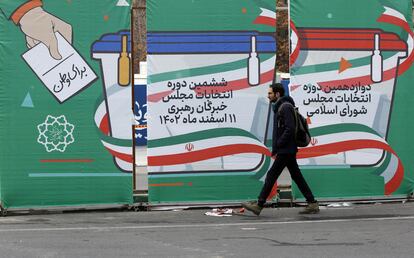Iran holds elections amid fears of record abstention reflecting public unrest
Polls predict low turnout in first election since the death of Mahsa Yina Amini in police custody


Twenty-something, slim, petite, with long dark hair worn loose, dressed in jeans and a T-shirt. That is the description of the young woman who approached an Iranian public television team in Tehran at the intersection of the central avenues of Vali Asr and Azadi last Tuesday, February 27, at 5:30 in the afternoon. The girl pulled off her mandatory veil and T-shirt in front of the camera and, in her bra, began to wave the garments above her head and shout: “Elections without votes” and “[Iranians] will not vote.” According to two eyewitness accounts obtained by EL PAÍS, members of the Iranian security forces beat her while trying to cover her with a chador, the long cloak-like garment worn by women in Persian-influenced countries. They then dragged her into a van and drove off.
The cameras were there to report on a student debate about the two elections being held March 1 in Iran: the legislative elections and those of the Assembly of Experts, the body that is in charge of choosing the successor to the country’s supreme leader, something that could happen during this next eight-year term as the current supreme leader, Ayatollah Ali Khamenei, is 84.
These elections are the first to be held in Iran since the protests sparked by the death on September 16, 2022, of Mahsa Yina Amini, a young Kurdish woman who, three days earlier, had been arrested in Tehran on charges of not wearing the hijab in the correct fashion. Her death in police custody triggered a wave of anti-regime demonstrations, which were quelled by a crackdown that cost the lives of at least 500 people, according to Iranian human rights NGOs in exile. Another 22,000 were arrested and eight young men were hanged.
A rejection of the regime is still evident in gestures of civil disobedience, such as that of the thousands of Iranian women who have dispensed with the veil. This disaffection is compounded by a serious economic crisis with inflation hovering around 50%. The challenge in this climate of disillusionment is for the authorities to achieve an acceptable voter turnout, though the outcome of the vote is known in advance: in other words, an overwhelming majority of ultra-conservatives in Parliament and a total control of the candidates by the Assembly of Experts. The regime’s pre-selection of candidates to both bodies has eliminated any other possibility, as almost all reformists, who hope to change the Iranian political system from within, have been vetoed.
Ever since the founder of the Islamic Republic of Iran, Ayatollah Ruhollah Khomeini, declared in 1979 that the popular vote is “the measure of the policies of the state,” the country’s leaders have used the turnout figures in past elections — sometimes amounting to over 70% — to legitimize their government. Iranian expert Saeid Golkar, Professor of Political Science at the University of Tennessee in the U.S., describes it as a “masquerade of democracy” in which ballot boxes are set up, but do not decide the distribution of power, “just as happens in other authoritarian regimes.”
Façade of legitimacy
“The elected institutions in Iran are there only to provide this façade of legitimacy,” says Golkar. “They have no other function, apart from allowing a clientelistic distribution of wealth among the followers of the regime and particularly of Ayatollah Khamenei.”
If, as predicted, a large number of the 61 million Iranian voters refuse to go to the polls, this so-called legitimization will be undermined, and the regime’s legitimacy crisis, already reflected in the poor turnout figures for the 2020 elections (42.57%), will deepen. The repression shown during the protests triggered by Mahsa Amini’s death is one of the main factors suggesting that figure could be even lower in the March 1 elections. Golkar insists that “each new cycle of repression convinces more and more Iranians not to vote because they know that nothing will change.”
According to a poll in December by the pro-government Iranian Students Polling Agency (ISPA), less than 28% of Iranian voters will definitely vote. Another poll by the same agency on February 28 raised that figure to 41%, while another opinion poll by the Washington-based Middle East Institute estimates voter turnout at 34%. Golkar considers that these figures will be even lower in large cities such as Tehran, where he believes turnout could plummet to between 10% and 15%.
According to political scientist Ali Alfoneh from the Arab Gulf States Institute in Washington (AGSIW), “In Iran, the mere fact of participating in elections, regardless of who the people vote for, is perceived by the regime as a renewal of loyalty” to the supreme leader. From Tehran, Iranologist Raffaele Mauriello, professor at Allameh Tabataba’i University, stresses that the vote “is a fundamental element of legitimization in the Iranian political system, along with others such as religious legitimacy.”
On Tuesday, February 27, the supreme leader urged Iranians again to come out to vote and defined those who are calling for abstention as “enemies of Iran.” This Thursday, February 29, the Iranian exile media Iranwire disclosed the arrest of 50 bloggers in the northwestern province of Azerbaijan, accused of “inciting abstention.”
No opposition
Both the more than 15,000 candidates for the 290 seats in Parliament and the 144 candidates for one of the 88 seats in the Assembly of Experts have been pre-selected by the Guardian Council, an institution composed of 12 Islamic jurisconsults, six of whom are chosen directly by Khamenei. The vast majority of reformist candidates have already been disqualified, with approximately 30 being allowed to run, of which even fewer are expected to be elected. Consequently, their presence in Parliament will be irrelevant. A handful of conservative candidates have also been disqualified for being considered insufficiently loyal to the supreme leader.
The pre-selection of candidates for the Assembly of Experts has been even more restrictive than for Parliament, in what some analysts interpret as an attempt to preserve the status quo after the possible death of the supreme leader. Even former President Hassan Rohani has been vetoed for re-election in the Assembly that will elect Khamenei’s successor.
In these circumstances, the Reform Front, a coalition of reformist parties and organizations, has refused to run in elections that it has described as “meaningless, non-competitive and ineffective.” On Thursday, February 29, teachers’ unions called on teachers not to vote, according to the Persian-language edition of Voice of America.
Activists who supported the latest anti-regime protests have also called for a boycott. The 2023 Nobel peace laureate Narges Mohammadi posted a letter with the following request on her Instagram account earlier this week: “Boycotting elections under a despotic religious regime is not a political act, but a moral obligation for freedom-loving, justice-seeking Iranians.” Mohammadi is serving a 10-year prison sentence in Tehran’s Evin Prison.
Sign up for our weekly newsletter to get more English-language news coverage from EL PAÍS USA Edition
Tu suscripción se está usando en otro dispositivo
¿Quieres añadir otro usuario a tu suscripción?
Si continúas leyendo en este dispositivo, no se podrá leer en el otro.
FlechaTu suscripción se está usando en otro dispositivo y solo puedes acceder a EL PAÍS desde un dispositivo a la vez.
Si quieres compartir tu cuenta, cambia tu suscripción a la modalidad Premium, así podrás añadir otro usuario. Cada uno accederá con su propia cuenta de email, lo que os permitirá personalizar vuestra experiencia en EL PAÍS.
¿Tienes una suscripción de empresa? Accede aquí para contratar más cuentas.
En el caso de no saber quién está usando tu cuenta, te recomendamos cambiar tu contraseña aquí.
Si decides continuar compartiendo tu cuenta, este mensaje se mostrará en tu dispositivo y en el de la otra persona que está usando tu cuenta de forma indefinida, afectando a tu experiencia de lectura. Puedes consultar aquí los términos y condiciones de la suscripción digital.








































